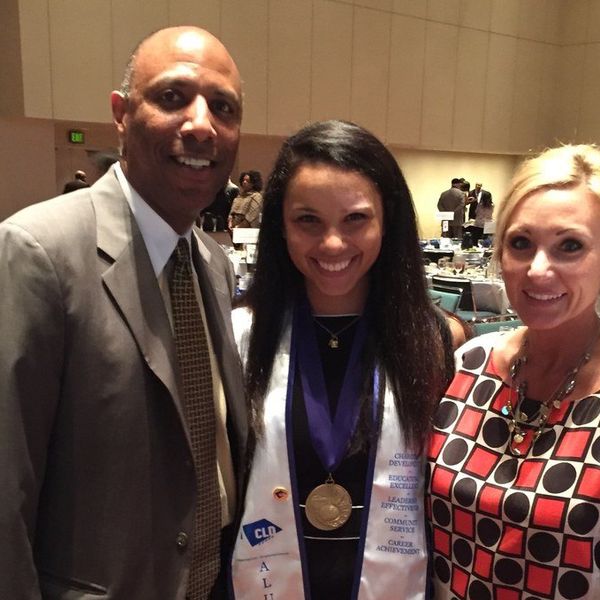I walk around the University of Richmond standing at a triumphant 5 feet tall, sporting a healthy afro puff for added height, and always with a smile on my face. But as happy as I am to be a student here, something isn’t quite right. Any African American student at a predominantly white institution (PWI) like University of Richmond can tell you the familiarity of this feeling. To tell the truth, I do not look like the default University of Richmond student- and this is confirmed by the subtle surprise and I get whenever I meet adults and tell them that I’m a proud Spider. On a campus like mine, it’s all too easy to feel like you don’t belong, and that makes the entire college experience different from what most are going to have. Despite this diversity issue that is out of my control, the black community at Richmond thrives and excels.
I believe that their voices always should be heard, so I spoke to Ivana Marshall (class of 2017) and Dr. Bertram Ashe (professor of English and American Studies). I wanted to know more about their own experiences compared to mine, so I asked them a few questions about issues that I’ve had to confront during my first few weeks on campus.
At Richmond, the first thing we confront as black students is having to become instantly more aware of our identity since it differs from the majority of the school. “When I walk around our campus, my campus, I am often hyper-aware of the way that both my body and my presence are politicized by peers and faculty. As an almost six-foot, dark-skinned, black woman with a huge afro, I can see the stares and hear the whispers miles away. Often, I think people are intrigued or curious. I am approached regularly with questions and compliments about my appearance.” explains Ivanna.
Dr. Ashe is a highly revered professor at Richmond, but his experience isn’t too different from ours. He writes “I’m both aware and unaware of my blackness on campus. It’s the familiar hypervisibility and invisibility canard, I suppose. It’s hard to tell how others view me, but I generally feel my status as professor is respected by those who should show me respect...Sure, I’m more aware of my racial identity at this PWI, but then, I would likely be more aware of my black individuality at an HBCU… I hope other blacks here at UR are finding community wherever they seek it, no matter whom that community consists of. I’d be happy if that was the case.”
It isn’t uncommon for black students to be the subject of the social curiosities of fellow classmates, and I’ve also had to deal answering questions about the versatility of my hair, clothing, and the way I speak. Who we are is natural to us, and explaining yourself to another student can sometimes confirm your identity as an outsider. Despite the many cultural Q&A sessions I will inevitably have, I find them to be healthy, productive discussions that expose my classmates to a world that they may have never interacted with otherwise. So far, I am always met with support and acceptance, and more than often I find myself more similar to other people than we all expected.
The way we are viewed by other classmates who we don’t have the chance to speak to is a different story. The sad reality of black students in predominantly white institutions is that there will always be people who make assumptions about us based on stereotypes, and not who we really are. We are burdened with knowing that students often already think they know our story, and they almost always get it wrong.
I’ve experienced many of the people I have met so far being taken aback by my upbeat, optimistic, and extroverted personality. When they ask what I love and what I want to study, they never expect my unparalleled passion for art history. Many have a one size fits all perception of black students despite the fact that they are always incorrect. I am aware that the first impression people have of me is a reserved young woman with no interest in social interaction with others, and it is ultimately a product of historical and contemporary judgments placed upon young black men and women.
Ivanna describes a similar situation, even though she is in fact one of the most incredible women I have ever met in my life. “As a senior,” she says “I have grown accustomed to the hustle and bustle of fully involved college life. Recently, one of my advisors told me that she was “worried about me” because I had barely blinked in the midst of total chaos. To others, this calm exterior comes off as intimidating, which is another term I hear more often than I would prefer. Sometimes, I cannot distinguish if I intimidate people because of my stature...” She says that “I have to be hyper- aware of the way that I present myself around campus. Despite that, my goal has always been to not lose my voice out of fear that I am subduing someone else’s.” This goes to show that even the most intelligent and friendly black students on our campus are subject to having to confront the way that people have predicted us to behave.
Despite the issues that black students face on our campus, it is important to know that we all thrive and excel in countless ways. We learn to channel the embracing of our identity into building a strong sense of community within our academic and social extracurriculars. We are not afraid of speaking up for ourselves, nor do we fear our opinion being dismissed by classmates who do not value our perspective. As black students at the University of Richmond, we will never allow the politics that come with our skin color stop us from growing and achieving everything in our hearts. As Ivana writes, “I have been able to channel any negative conversations and interactions that I’ve had into constructive work spaces. In my class assignments, I make sure to talk about social justice. In my extra- curricular involvements, I only surround myself with people who have passions for causes that are greater than self- serving mentalities. Because I am hyper- aware of my identity and presence on campus, I only channel my energy into things I love doing.”
Me, Ivana, and Dr. Ashe are only a small part of our larger black community on campus. There are many other black voices and stories that we must, as a student body, work to make an inclusive space for. Our voices must always be heard, and always be received with value. As black students, we are always embracing our identity instead of shying away from it. We are constantly growing and evolving into the scholars and leaders of the future, adorned by our dark skin, kinky hair, intellect, and never ending passion.




















